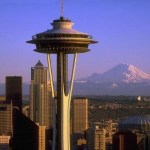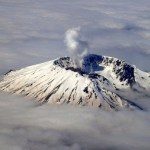Geology
The Yellowstone River, photographed near Tower Falls in Yellowstone National Park.
Anemone Geyser, a small but frequently-erupting geyser in Yellowstone's Upper Geyser Basin.
A shot of the scenery taken on the way back from an early-morning hike to the Red Fleet Reservoir dinosaur track site in northern Utah.
This week, Eruptions' Erik Klemetti sparked interest in the recent rumblings heard coming from Mt. Rainier in Washington State when he responded to a reader's comment on increased seismic activity in the area over the past month. Klemetti's response post, which reported on concrete facts surrounding the geologic events and featured a detailed graph of Mt. Rainier's seismic activity over the past year, yielded a slew of comments and stirred fellow blogger, Greg Laden, to post a related story, which also garnered lively commentary. Ironically, Klemetti's following post detailed this viral…
One of the "staircases" of rock in the thermal basin of Mammoth Hot Springs, Yellowstone.
A close up of the thin layers of rock around one of the pools at the Norris Geyser Basin in Yellowstone National Park.
tags: South Pacific Islands, Indonesia, Sumatra, geology, nature, volcano, global warming, Lake Toba, PBS, NOVA, television
Sixty-two-mile-long Lake Toba, seen in the center of this satellite image,
was created by the largest explosive volcanic eruption of the past
100,000 years -- an eruption whose aftermath holds important clues for us
today about rapid climate change, Drew Shindell says.
Image: NASA.
Wow, there are days when I wish I had a television, and today is one of them. Why? Tonight, PBS is showing a really fascinating program; a NOVA show entitled Mystery of the Megavolcano that…
Bloggingheads.tv just posted a conversation Greg Laden and I had about the second-biggest scientific controversy of Darwin's time, and of Darwin's life: the argument over how coral reefs form. The coral reef argument was fascinating in its own right, both scientifically and dramatically -- for here a very capable andn conscientious scientist, Alexander Agassiz, struggled to reconcile both two views of science and the legacies of the two scientific giants of the age, one of whom was his father.
His story -- and the tumultuous 19th-century struggle to define science and empiricism -- is the…
Earlier this month I shared with you a review of Stories in Stone, a new book on urban geology by David Williams. It was a very enjoyable read, but I had a few questions about it. Fortunately David was glad to answer them, and you can see my interview with him below;
[Brian Switek] What got you interested in geology in the first place, and urban geology in particular? When did the idea for Stories in Stone first strike you?
[David Williams] An intro to physics class sparked my interest in geology. After getting a 16% on a three-hour quiz, I realized I wasn't cut out for physics.…
Dr. Free-Ride: So, where do you think land comes from?
Younger offspring: Land comes from ... I don't know.
Dr. Free-Ride: If you had to guess ...
Younger offspring: Land comes from a whole giant island. And then it breaks apart since the dinosaur times.
Dr. Free-Ride: So, like one big continent that sort of all used to be together?
Younger offspring: Yeah. They broke up. Even Australia and Antarctica.
Dr. Free-Ride: That's interesting. Do you have any ideas about how or why it broke up from one big land mass?
Younger offspring: Volcano rocks? I mean, volcanoes?
Dr. Free-Ride: Well, I…
Yesterday afternoon, I attempted to talk with the younger Free-Ride offspring about erosion. It would seem, from our conversation, that it is not just rocks that can erode -- recall of material learned in science class can also erode, as can patience.
Below is a rough transcript of our chat. I'll see if I can clean up the audio and put the MP3 up as a SprogCast by sometime this weekend.
Dr. Free-Ride: I wanted to ask you what you can tell me about rocks. I think you learned a little about rocks in school, didn't you?
Younger offspring: No.
Dr. Free-Ride: No? Did you learn something about…
A friend just pointed me to this... illuminating bit of polling data on the Daily Kos website:
QUESTION: Do you believe that America and Africa were once part of the same continent?
24% of Republican respondents answered "yes". 47% answered no.
That's right - Republicans rejected plate tectonics by about a 2:1 margin. Words seriously fail me at this point.
By the spring of 2008 Rutgers University was overflowing with undergraduates. In an attempt to lessen the sting of the budget crisis Rutgers admitted more students than it had room for even though everyone knew this was not a permanent solution. Hotels acted as makeshift dorms, and the few buses that shuttled students between campuses brought the individual members of the student body a bit too close for comfort.
Given that I lived in New Brunswick, though, I could afford to walk. Walking between the Cook and College Avenue campuses took about as long as it did to take the bus, and on same…
As someone who was born on a lunar eclipse (explains a lot, no?) the 40th anniversary of man walking on the moon has a special place in my heart. Okay, that sentence makes no sense (I was born on a lunar eclipse however), but anyway everyone is all abuzz about the anniversary of the moon landing so it's as good as any sentence to let me talk about booming sand dunes.
Booming whah?
Take a big sand dune. Kick some of the sand down the face of the dune. Sometimes, if you are lucky, the sand dune will emit a loud 70 Hz to 100 Hz booming sound. I used to have a sealed container of the booming…
tags: science, geology, Grand Canyon, religion, creationism, humor, funny, streaming video
The Grand Canyon is such an icon of the Earth's geological history, of slow and steady uplift, erosion, submergence and deposition, that the creationist crowd thought it essential to tackle it head on. So they have come up with an explanation as to how it might have got there in a world created only 6,000 years ago. Their attempts to squeeze this majestic testament to natural processes into bronze age mythology are not just clumsy, they're the stuff good comedy is made of [10:03]
Last weekend, some ultra-powerful movers, shakers, and carvers of our planet caught ScienceBloggers' attentions. First, researchers debated the potential for Mt. Saint Helens to form a supervolcano, an extraordinarily large volcano with the potential to cause massive wildlife destruction and devastating impacts on climate. Bloggers also discussed two megafloods: one that permanently separated Great Britain from continental Europe, and another that firmly established the topography, soils, and agriculture of the Pacific Northwest. While the Pleistocene epoch may not have been the most…
Retweeting Zuska:
Kim at All of My Faults Are Stress Related asks:
I've got a question for women readers, especially those in the geosciences, environmental sciences, or field sciences: what do you get out of reading blogs? And if you have a blog yourself, what do you get out of writing it?
I'm asking because there's a session at this year's Geological Society of America meeting on "Techniques and Tools for Effective Recruitment, Retention and Promotion of Women and Minorities in the Geosciences" (and that's in the applied geosciences as well as in academia), and I wondered whether blogs…
At this moment there are more anti-creationism books available than I care to count. While they can be exciting for neophytes to dig into many repackage the same information and arguments over and over again, and they can quickly grow boring for those who have been following the creationism controversy closely. That is why I was excited to see that the new book For the Rock Record: Geologists on Intelligent Design was going to allow geologists and paleontologists to respond to creationist claims.
The primary difficulty with the volume, however, is that intelligent design does not have much…
In the wake of Monday's earthquake in the L'Aquila region of Italy that killed over 200 people, news emerged that one Italian scientist had predicted the earthquake less than two weeks earlier. Giampaolo Giuliani's predictions were broadcast on March 28 but was dismissed by Italian authorities--and rightly so, according to ScienceBloggers. The radon-measurement technique Giuliani based his prediction on has proven to be unsuccessful in the past. "Any geologist would be celebrating a genuine, proven, method of earthquake prediction," said Chris Rowan of Highly Allochthonous, "but we're clearly…

